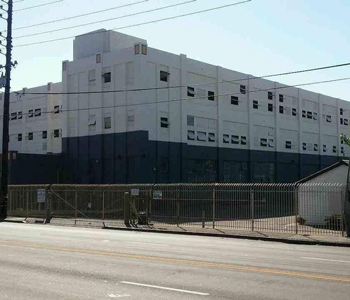A real estate investment firm scored a $55 million loan for its plan to redevelop a former fruit cannery in Oakland into a massive cannabis-focused facility, The Real Deal has learned.
The loan ranks as one of the biggest single-asset real estate financing deals in the cannabis industry. The two-year loan replaces existing debt on the project and proceeds will be used to complete the redevelopment.
Denver-based Green Sage secured the debt to transform the 441,000-square-foot property — comprised of two buildings — turning it into a place where tenants will research, cultivate and distribute cannabis.
The loan was provided by a Canadian lender. Lotus Capital Partners, a New York-based firm that arranged and announced the deal, declined to identify the lender’s name. Jon Ikenna of Lotus said the project is about 75 percent complete.

The Tinnery building on San Leandro Street
Green Sage, which specializes in the cannabis industry, will redevelop the Art Deco-style Cannery and Tinnery buildings on San Leandro Street, on the West shore of the San Francisco Bay. The project is being called Cannery & Tinnery.
Green Sage bought both buildings in 2017, records show. It paid $14 million for the Cannery building, which housed 25 live-work units.
For decades, Del Monte Foods produced the tin cans for its food products at the Oakland complex. It was then converted in the 1970s, and has been home to a community of artists since. Shortly after Green Sage made its redevelopment plans public, a heated battle between the artists — who lived there and opposed the project — and the cannabis firm ensued.
That prompted Oakland officials to pass a law protecting residents who live in cannabis-friendly “Green Zones.” The law, passed in March 2018, restricts cannabis businesses from operating in locations previously used as live-work or residential spaces.
Half a dozen tenants encompassing different aspects of the cannabis supply chain have signed onto the project, Ikenna said. The range of tenants helped reduce risk, making it a more attractive option to institutional investors, he added.
In April, luxury cannabis manufacturer Coda Signature, also based in Denver, inked a deal to lease 21,000 square feet at the Tinnery building. It plans to hire about 200 workers once it opens.
While investment in cannabis-friendly industrial properties is growing in Northern California, a much more consumer-friendly movement is taking place down the coast. This month, the nation’s first cannabis lounge is expected to open in West Hollywood. The owners behind the Lowell Cafe scored their local business license in July, and are awaiting a state license.
